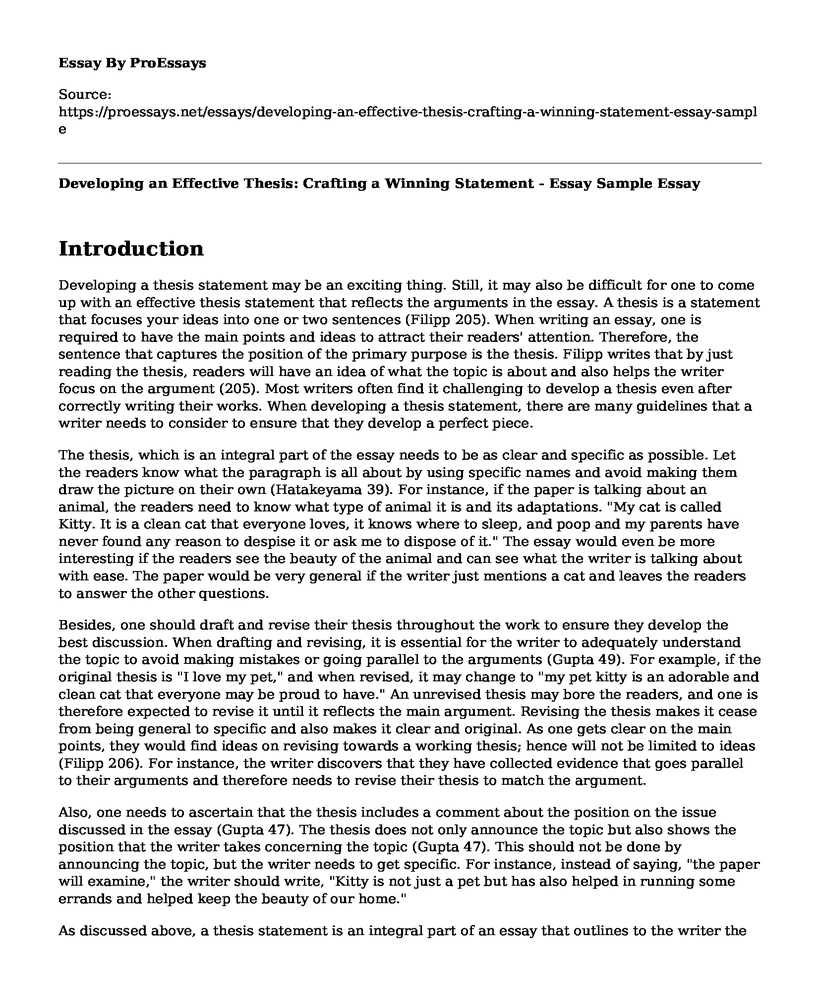Introduction
Developing a thesis statement may be an exciting thing. Still, it may also be difficult for one to come up with an effective thesis statement that reflects the arguments in the essay. A thesis is a statement that focuses your ideas into one or two sentences (Filipp 205). When writing an essay, one is required to have the main points and ideas to attract their readers' attention. Therefore, the sentence that captures the position of the primary purpose is the thesis. Filipp writes that by just reading the thesis, readers will have an idea of what the topic is about and also helps the writer focus on the argument (205). Most writers often find it challenging to develop a thesis even after correctly writing their works. When developing a thesis statement, there are many guidelines that a writer needs to consider to ensure that they develop a perfect piece.
The thesis, which is an integral part of the essay needs to be as clear and specific as possible. Let the readers know what the paragraph is all about by using specific names and avoid making them draw the picture on their own (Hatakeyama 39). For instance, if the paper is talking about an animal, the readers need to know what type of animal it is and its adaptations. "My cat is called Kitty. It is a clean cat that everyone loves, it knows where to sleep, and poop and my parents have never found any reason to despise it or ask me to dispose of it." The essay would even be more interesting if the readers see the beauty of the animal and can see what the writer is talking about with ease. The paper would be very general if the writer just mentions a cat and leaves the readers to answer the other questions.
Besides, one should draft and revise their thesis throughout the work to ensure they develop the best discussion. When drafting and revising, it is essential for the writer to adequately understand the topic to avoid making mistakes or going parallel to the arguments (Gupta 49). For example, if the original thesis is "I love my pet," and when revised, it may change to "my pet kitty is an adorable and clean cat that everyone may be proud to have." An unrevised thesis may bore the readers, and one is therefore expected to revise it until it reflects the main argument. Revising the thesis makes it cease from being general to specific and also makes it clear and original. As one gets clear on the main points, they would find ideas on revising towards a working thesis; hence will not be limited to ideas (Filipp 206). For instance, the writer discovers that they have collected evidence that goes parallel to their arguments and therefore needs to revise their thesis to match the argument.
Also, one needs to ascertain that the thesis includes a comment about the position on the issue discussed in the essay (Gupta 47). The thesis does not only announce the topic but also shows the position that the writer takes concerning the topic (Gupta 47). This should not be done by announcing the topic, but the writer needs to get specific. For instance, instead of saying, "the paper will examine," the writer should write, "Kitty is not just a pet but has also helped in running some errands and helped keep the beauty of our home."
As discussed above, a thesis statement is an integral part of an essay that outlines to the writer the main arguments in the essay and how the essay will take its course. Writers need to consider the issues discussed above to ensure that they develop an effective essay that follows all the required guidelines.
Works Cited
Filipp, Svetlana. "Developing an effective thesis statement in academic writing [Articol]." (2019). http://dspace.usarb.md:8080/xmlui/bitstream/handle/123456789/4508/Filipp_Svetlana_Developing_an_effective_thesis_statement_in_academic_writing.pdf?sequence=1&isAllowed=y
Gupta, Anju Sahgal. "Unit-3 The Writing Skill: Some Basic Guidelines." IGNOU, 2020. http://www.egyankosh.ac.in/bitstream/123456789/56630/1/B-3U-3.pdf
Hatakeyama, Yukako. "Student Perceptions on Pre-writing Processes: Challenges, Helpful Activities, and Noticing Seen Through Reflections." 語学研究= ICU Language Research Bulletin 32 (2018): 32-44. https://icu.repo.nii.ac.jp/?action=repository_action_common_download&item_id=4455&item_no=1&attribute_id=22&file_no=1
Cite this page
Developing an Effective Thesis: Crafting a Winning Statement - Essay Sample. (2023, May 22). Retrieved from https://proessays.net/essays/developing-an-effective-thesis-crafting-a-winning-statement-essay-sample
If you are the original author of this essay and no longer wish to have it published on the ProEssays website, please click below to request its removal:
- Destiny Against Individual Choice in The Tales of Canterbury. Literary Essay Sample.
- Poetry Analysis Essay on "Do Not Go Into That Good Night"
- Poetry Analysis Essay on "Embrace" by Billy Collins
- Essay Example on Interpretation of a Fiction Story: A Rose for Emily
- Essay Example on the Use of Symbolism and the Plot Analysis in "A Rose for Emily"
- Essay Example on Portraying Culture in Literature: Examining Homer's 'The Odyssey'
- Mental Book Review: "An Unquiet Mind" - Free Paper Sample







